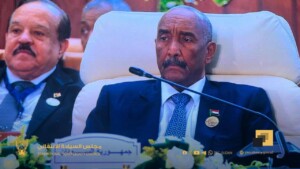Eastern Sudan conference to discuss alternatives to peace agreement
A large number of eastern Sudanese nazirs (native administration leaders), social and political leaders, and scholars attended the Peace, Development, and Justice conference that started in Sinkat in Red Sea state yesterday. The participants are to discuss alternatives for the peace agreement on eastern Sudan, negotiated between Khartoum and rebel movements in Juba in February.
 The conference on historical Beja rights in eastern Sudan that started yesterday (Social media)
The conference on historical Beja rights in eastern Sudan that started yesterday (Social media)
A large number of eastern Sudanese nazirs (native administration leaders), social and political leaders, and scholars attended the Peace, Development, and Justice conference that started in Sinkat in Red Sea state yesterday. The participants are to discuss alternatives for the peace agreement on eastern Sudan, negotiated between Khartoum and rebel movements in Juba in February.
The conference is organised by the High Council of Beja Nazirs and Independent Chieftains with the slogan 'Establishing Historical Rights'.
Head of the Hadendawa clan and Chairman of the Beja Council Sayed Tirik said in his opening speech that the conference represents most of the eastern Sudanese communities in Red Sea state, Kassala, and El Gedaref.
Beja council member Karar Askar told Radio Dabanga that Lt Gen Mohamed Hamdan ‘Hemeti’, Vice President of the Sovereign Council and Commander of the Rapid Support Forces militia*, will attend the closing session of the conference today. The recommendations of the conference will be presented to him.
The opening session was followed by discussions about the political rights of the Beja in the region, the crisis in the current transitional period, economic development, and the restructuring of the Beja Council itself.
Askar expects that the conference will come up with recommendations that reject the accord on the Eastern Sudan Track, which is part of the comprehensive peace agreement between the Sudanese government and the Sudan Revolutionary Front rebel alliance. The Eastern Sudan track accord was signed in Juba on February 21.
The accord was already controversial at the time that it was signed. In July, a committee was established to re-discuss the eastern Sudan track of the peace negotiations. Nazir Sayed Tirik said at the time that this was “to resolve the disputes resulting from a lack of coordination and consultation on the track”.
* Officially, the paramilitary Rapid Support Forces (RSF), set up by the ousted Al Bashir regime in August 2013, was integrated into the Sudan Armed Forces in August 2019. At the same time however, the militia stays a force unto intself.
Radio Dabanga’s editorial independence means that we can continue to provide factual updates about political developments to Sudanese and international actors, educate people about how to avoid outbreaks of infectious diseases, and provide a window to the world for those in all corners of Sudan. Support Radio Dabanga for as little as €2.50, the equivalent of a cup of coffee.












 and then
and then